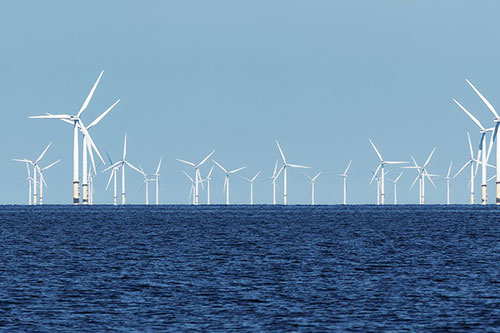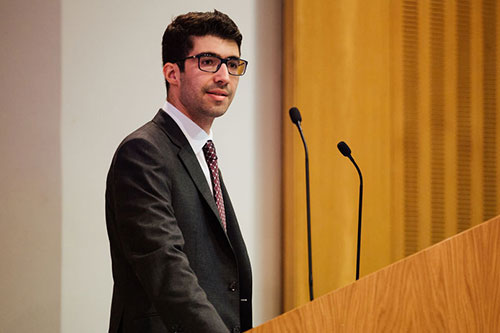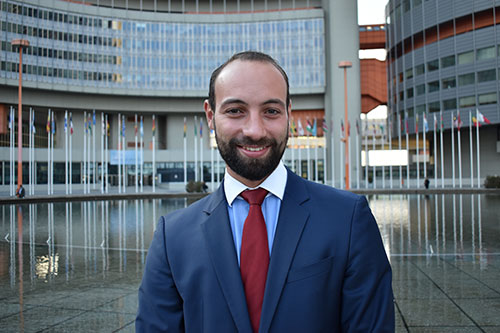Green Finance, Carbon Trading and Shipping Decarbonisation
At Bayes Business School, we offer the opportunity for students to tailor their master’s degree towards their career ambitions and gain up to date, industry-relevant knowledge, that will prepare them for their career.
The Costas Grammenos Centre for Shipping, Trade and Finance at Bayes Business School has introduced a new elective module “Green Finance, Carbon Trading & Shipping Decarbonisation” for students studying MSc Shipping, Trade and Finance and MSc Energy, Trade and Finance. This timely introduction is perfect for the aspiring students who desire to drive change, and not be driven by it.
Graduates coming into the market now are expected more than ever before to position themselves and their organisations – regardless of their role – amidst rapid industry shifts and market expectations. Acquiring the necessary knowledge and practical expertise is key to ensuring that the young professionals in the shipping and energy sectors will be able to identify and address the present and future challenges and be part of tomorrow’s solutions, today.
The introduction of the elective module in Green Finance, Carbon Trading and Shipping Decarbonisation addresses these important and current challenges within the industry and equips students with the knowledge and skills to navigate them.
The importance of Green Finance, Carbon Trading & Shipping Decarbonisation
Green finance is an emerging field that plays a vital role in addressing environmental challenges, future energy demand and driving the transition to a sustainable and low-carbon economy.
Increasing awareness of the environmental impact of economic activity has hastened initiatives to decouple economic development from environmental degradation. The transition to low-carbon alternatives is even more important in the context of increasing energy demands and the adverse effects the existing energy infrastructure has on the environment. Green Finance serves as a tool to promote economic development through sustainable investment that broadens access to environmentally-friendly goods and services, thereby supporting the energy transition and delivering both economic and environmental benefits.
The environmental profile of the shipping industry has also been undergoing ever-increasing scrutiny, with a particular focus on its emissions. Despite the carbon intensity of maritime shipping being the lowest among other means of cargo transport on a tonne-mile basis, seaborne trade represents more than 85% of the total. This places a great visibility and, ultimately, responsibility on the sector to decarbonise.
National and regional regulators have more recently started to “tighten their grip” on shipping. Its inclusion into the EU ETS is marking only the beginning of the transnational effort to accelerate decarbonisation and other jurisdictions are expected to follow, so it’s important that the next generation of shipping professionals are involved in these conversations and aware of how to navigate upcoming challenges within the sector.
The energy industry is reinventing itself in order to support the energy transition and decarbonisation across the wider transport and industry sectors, with major investments integrating renewable energy, clean fuels, electrification and carbon capture and storage (CCS). Nobody being currently part of the energy, shipping and financial community can afford to not be interested in decarbonisation!

Meet the lecturers
Nicolas Trikeriotis
“I graduated from MSc Shipping, Trade and Finance at Bayes in 2014. I am very excited to return to Bayes Business School as a guest lecturer for the elective module on Green Finance, Carbon Trading and Shipping Decarbonisation, alongside other graduates, and be part of the effort to cover this new stimulating, multidisciplinary topic.
Having originally studied Business Administration with a major in Accounting & Financial Management at the Athens University of Economics & Business, I enrolled on the MSc in Shipping, Trade & Finance at Bayes Business School (formerly Cass), which has been the breeding ground for some of the most distinguished professionals in the shipping, energy and financial sectors globally since the mid 80’s, when the course was established.

Throughout my career so far, I have been fortunate to have acquired diverse experiences spanning from shipping finance, market and business analysis, to digitalisation and decarbonisation. I started my industry career at Aegean Baltic Bank, a boutique bank largely focused on the shipping sector – where I acquired solid knowledge of the ship financing market – and later at Carbon Positive Services, a maritime emissions and carbon management consultancy (which was later absorbed by PwC Greece). Following my graduation from the master’s, I worked for a number of years at commercial shipping software provider Veson Nautical, while since 2017, I have been working with the commercial team of Clarksons offering analytics and consultancy services to clients across the gases’ value chain, including alternative fuels and decarbonisation, alongside shipping and commodity market fundamentals. More recently, I have been part of the company’s task force in CO2 & clean ammonia projects and freight strategies.
I am grateful that my career path has enabled me to get exposure to different facets of the industry and I am excited to share my knowledge and keen interest in these areas with the students of the School and the Centre that has laid the foundation of the professional journey and growth of thousands of graduates for almost 40 years.”
Iakovos Bazinas
“I studied economics and management at Durham University and Webster University, Vienna. Developing a comprehensive understanding of economic principles, global markets and managerial practices served as a critical foundation for my career, but I was always more inclined towards practical applications of these skills rather than mere theoretical study. During my undergraduate studies I interned at various financial and public sector institutions including the United Nations, UniCredit Bank Austria, and the Public Gas Corporation of Greece. These invaluable experiences led me to the realisation that the critical issues that will shape the future - which are also intricately and unavoidably linked - are resource (and specifically energy) management and environmental degradation.

Since graduating from Bayes Business School in 2014, I have been working with specialised agencies of the United Nations as a technical expert on Energy and Environmental Affairs based in Austria, Greece and Switzerland. Throughout this time, I co-developed and implemented 15 technical cooperation and sustainable development projects in the areas of energy efficiency, renewable energy, low-carbon transport, e-mobility and aviation, with the aim of creating wealth and stimulating economic growth while simultaneously mitigating adverse environmental effects. As a result, I have developed extensive experience primarily focused in the areas of project implementation, risk analysis and financial auditing. Currently, I work as an auditor for the United Nations, based in Geneva, with a focus on economic and sustainable development projects in Europe.
I believe we are at the beginning of a new industrial revolution as renewable energy and environmentally-friendly technologies become more profitable for investors; an energy race that will spur innovation and investment. I’m excited to teach on this new elective module and share insights on this important topic with the next generation of professionals."
Find out more about our master’s degrees in shipping and energy